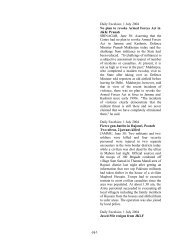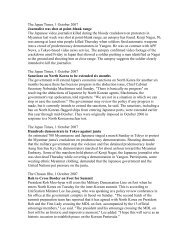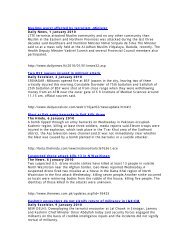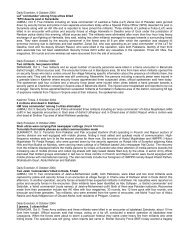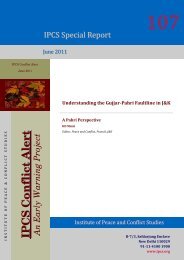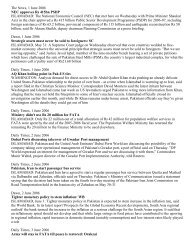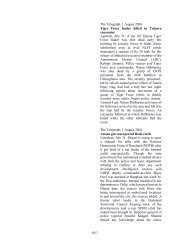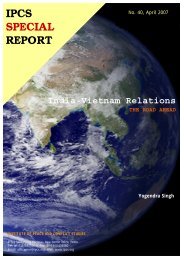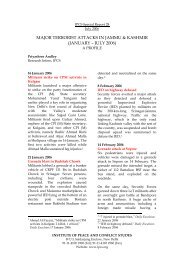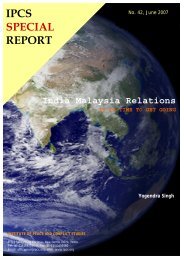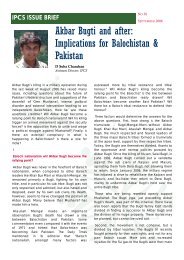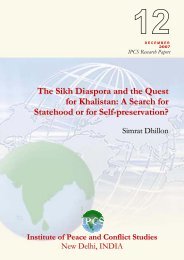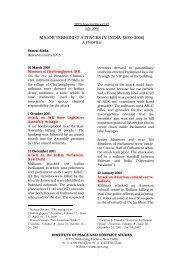India and Southeast Asia: A Personal Narrative from Chennai
India and Southeast Asia: A Personal Narrative from Chennai
India and Southeast Asia: A Personal Narrative from Chennai
Create successful ePaper yourself
Turn your PDF publications into a flip-book with our unique Google optimized e-Paper software.
IPCS SPECIAL REPORT #139, MARCH 2013<br />
extinction of a professional class. The main reason was that “between 1964 <strong>and</strong> 1988,<br />
<strong>India</strong>ns were denied admission to the Universities <strong>and</strong> professional courses” (19).<br />
The number of 50,000 stateless people of <strong>India</strong>n origin in Malaysia is, according to<br />
perceptive observers of the Malaysian scene, an under-estimate. The number will be<br />
around 100,000. The Federation of Malaya Constitution which was enacted in 1957<br />
provided for Jus Soli i.e. citizenship by birth. The affected people, except for a miniscule<br />
illegal immigrants, are third or fourth generation Malaysians. But due to ignorance or<br />
apathy of the plantation management they did not register the births <strong>and</strong> hence are<br />
unable to produce birth certificates. And if you are not a citizen of Malaysia you are not<br />
entitled for free education, medical benefits <strong>and</strong> employment. The leaders of<br />
HINDRAF have taken up the cause of the stateless people.<br />
It is interesting to note that there are large numbers of illegal immigrants <strong>from</strong><br />
Indonesia, but since they belong to the Malay race <strong>and</strong> speak the same language they<br />
easily get assimilated with the indigenous people. In an earlier period, after May 13,<br />
1969, when Malaysia faced mounting unemployment <strong>and</strong> the Government introduced<br />
the system of work permits, the issue was resolved amicably because of the excellent<br />
personal equation between Indira G<strong>and</strong>hi <strong>and</strong> Malaysian Prime Minister Tun Abdul<br />
Razak. The <strong>India</strong>n community also faces other grave problems. The Hindu temples are<br />
getting demolished, creating a feeling of panic among the Malaysian <strong>India</strong>n community.<br />
People of Tamil origin have not been able to get the benefits of higher education <strong>and</strong><br />
they are becoming victims of alcoholism, crimes <strong>and</strong> drug trafficking. What is still more<br />
saddening is the fact that the Malaysian <strong>India</strong>n Congress, which represents the <strong>India</strong>n<br />
community in the government, has miserably failed to protect <strong>and</strong> promote the<br />
interests of the <strong>India</strong>n community. New Delhi should not adopt a “h<strong>and</strong>s off policy”<br />
towards these unfortunate people; it must open a dialogue with the Malaysian<br />
government to ensure that the stateless people of <strong>India</strong>n origin are conferred<br />
citizenship.<br />
V<br />
CHINA’S GROWING INFLUENCE IN SOUTHEAST ASIA<br />
China has made tremendous strides in winning friends <strong>and</strong> influencing people in<br />
<strong>Southeast</strong> <strong>Asia</strong>. From being viewed as a country which promoted communist<br />
insurrections <strong>and</strong> a country which exerted political <strong>and</strong> economic pulls on the ethnic<br />
Chinese, today China is being viewed as a benign super power. The main contributory<br />
factor for this transformation had been astute Chinese diplomacy. When China began<br />
its policy of liberalization, it was convinced that if the main objective of economic<br />
progress is to be accomplished, a peaceful environment was essential.<br />
Therefore, it lent its support to the process of détente <strong>and</strong> was keen to avoid frictions in<br />
bilateral <strong>and</strong> regional relations. However, the brutal suppression of the pro-democracy<br />
movement in June 1989 is an illustration that China’s ruling elite will be prepared to go<br />
to any extent in order to cling on to power. While there was underst<strong>and</strong>able concern<br />
<strong>and</strong> criticism in the United States, the <strong>Southeast</strong> <strong>Asia</strong>n countries were less inclined to<br />
allow the Tian An Men incident to disrupt their relations with China. In a world of<br />
shrinking geographical boundaries <strong>and</strong> widening intellectual horizon, how can China<br />
insulate itself <strong>from</strong> the winds of democracy sweeping across the world?<br />
China has made tremendous<br />
strides in winning friends <strong>and</strong><br />
influencing people in<br />
<strong>Southeast</strong> <strong>Asia</strong>. From being<br />
viewed as a country which<br />
promoted communist<br />
insurrections <strong>and</strong> a country<br />
which exerted political <strong>and</strong><br />
economic pulls on the ethnic<br />
Chinese, today China is being<br />
viewed as a benign super<br />
power.<br />
When the <strong>Southeast</strong> <strong>Asia</strong>n countries were engulfed in a serious economic crisis in the<br />
late 1980’s <strong>and</strong> the international financial institutions <strong>and</strong> developed countries like the<br />
11



